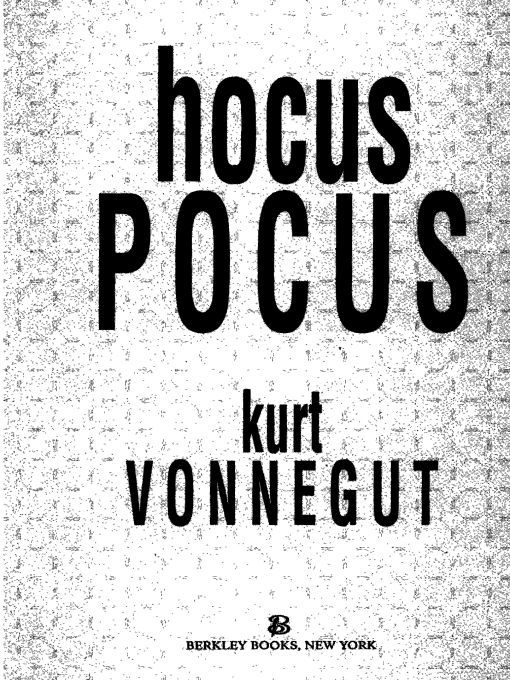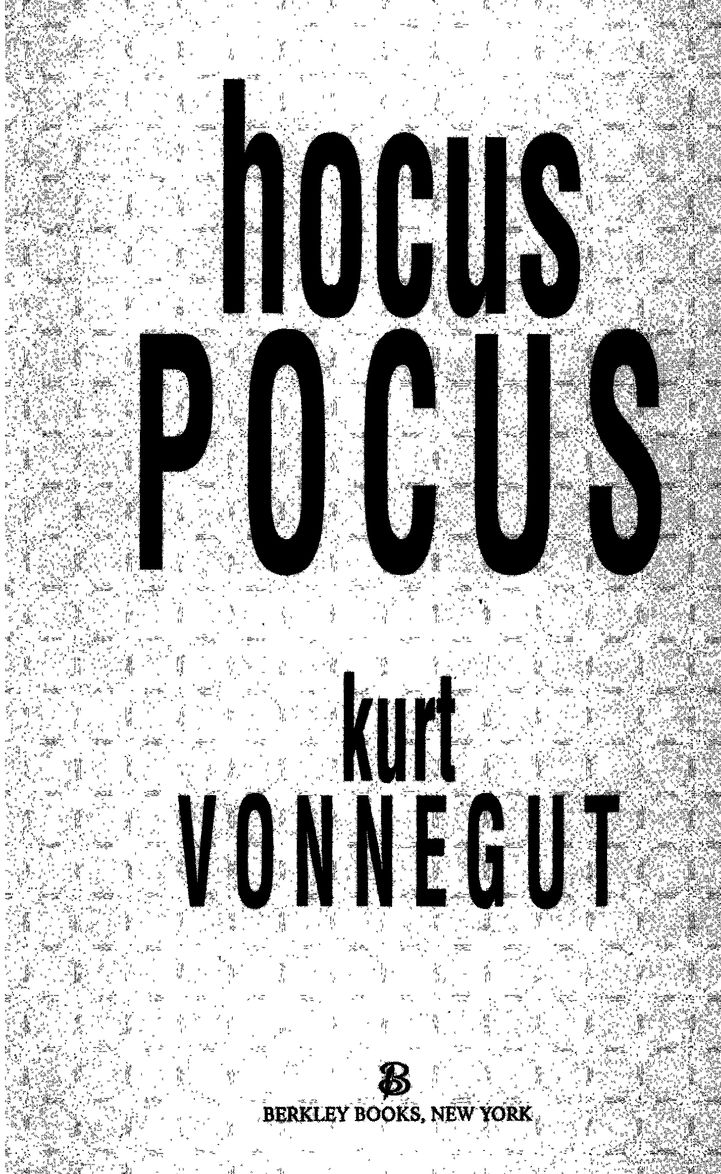Hocus Pocus
Authors: Kurt Vonnegut


Table of Contents
“A classic.”—
Chicago Tribune
Chicago Tribune
“Comic, absorbing ... one of the finest achievements of his career.”—
Philadelphia Inquirer
Philadelphia Inquirer
“A triumph. It is perhaps his best. Vonnegut is again on target, and this time he hits the bull’s-eye.”—Joseph Heller
“Great news ...
Hocus Pocus
is a really funny book. A wonderfully dark fable ... Vonnegut enters the ’90s with a satire that has both the savage bite and the sympathetic heart that first drew us to him.”—
Milwaukee Journal
Hocus Pocus
is a really funny book. A wonderfully dark fable ... Vonnegut enters the ’90s with a satire that has both the savage bite and the sympathetic heart that first drew us to him.”—
Milwaukee Journal
“Triumphant ... Vonnegut is back.”—
Denver Post
Denver Post
“Marvelous scathing satire. An exercise in spirited literature. He pokes and prods at the house of cards created by our recent society.”—
Pittsburgh Press
Pittsburgh Press
“Vonnegut’s touch is light, but his satire weaves a web of black humor that almost startles you by the gathering force.”
—
Seattle Times
Seattle Times
“Hilarious ... pure Vonnegut. Highly entertaining and provocative.”—
Houston Post
Houston Post
“Refreshing ... demented ... no one deflates the vanities of the human race like Vonnegut.”—
Arizona Republic
Arizona Republic
“Vonnegut conjures up a mad, future life ... He is a very public novelist, one who, God bless him, hopes to make the world a better place.”—
USA Today
USA Today
“Plainspoken honesty and unpretentious charm.”
—
Entertainment Weekly
Entertainment Weekly
Books by Kurt Vonnegut
PLAYER PIANO
THE SIRENS OF TITAN
MOTHER NIGHT
CAT’S CRADLE
GOD BLESS YOU,
MR.
ROSEWATER
WELCOME TO THE MONKEY HOUSE
SLAUGHTERHOUSE-FIVE
HAPPY BIRTHDAY, WANDA JUNE
BREAKFAST OF CHAMPIONS
WAMPETERS, FOMA & GRANFALLOONS
SLAPSTICK
JAILBIRD
PALM SUNDAY
DEADEYE DICK
GALAPAGOS
BLUEBEARD
HOCUS POCUS
FATES WORSE THAN DEATH
TIMEQUAKE
BAGOMBO SNUFF BOX
THE SIRENS OF TITAN
MOTHER NIGHT
CAT’S CRADLE
GOD BLESS YOU,
MR.
ROSEWATER
WELCOME TO THE MONKEY HOUSE
SLAUGHTERHOUSE-FIVE
HAPPY BIRTHDAY, WANDA JUNE
BREAKFAST OF CHAMPIONS
WAMPETERS, FOMA & GRANFALLOONS
SLAPSTICK
JAILBIRD
PALM SUNDAY
DEADEYE DICK
GALAPAGOS
BLUEBEARD
HOCUS POCUS
FATES WORSE THAN DEATH
TIMEQUAKE
BAGOMBO SNUFF BOX

THE BERKLEY PUBLISHING GROUP
Published by the Penguin Group
Penguin Group (USA) Inc.
375 Hudson Street, New York, New York 10014, USA
Penguin Group (Canada), 90 Eglinton Avenue East, Suite 700, Toronto, Ontario M4P 2Y3, Canada
(a division of Pearson Penguin Canada Inc )
Penguin Books Ltd., 80 Strand, London WC2R ORL, England
Penguin Group Ireland, 25 St. Stephen’s Green, Dublin 2, Ireland (a division of Penguin Books Ltd.)
Penguin Group (Australia), 250 Camberwell Road, Camberwell, Victoria 3124, Australia
(a division of Pearson Australia Group Pty. Ltd.)
Penguin Books India Pvt. Ltd., 11 Community Centre, Panchsheel Park, New Delhi—110 017, India
Penguin Group (NZ), Cur. Airborne and Rosedale Roads, Albany, Auckland 1310, New Zealand
(a division of Pearson New Zealand Ltd.)
Penguin Books (South Africa) (Pty.) Ltd., 24 Sturdee Avenue, Rosebank, Johannesburg 2196,
South Africa
Penguin Books Ltd., Registered Offices: 80 Strand, London WC2R ORL, England
This is a work of fiction. Names, characters, places, and incidents either are the product of the author’s
imagination or are used fictitiously, and any resemblance to actual persons, living or dead, business
establishments, events, or locales is entirely coincidental. The publisher does not have any control over
and does not assume any responsibility for author or third-party websites or their content.
HOCUS POCUS
Published by the Penguin Group
Penguin Group (USA) Inc.
375 Hudson Street, New York, New York 10014, USA
Penguin Group (Canada), 90 Eglinton Avenue East, Suite 700, Toronto, Ontario M4P 2Y3, Canada
(a division of Pearson Penguin Canada Inc )
Penguin Books Ltd., 80 Strand, London WC2R ORL, England
Penguin Group Ireland, 25 St. Stephen’s Green, Dublin 2, Ireland (a division of Penguin Books Ltd.)
Penguin Group (Australia), 250 Camberwell Road, Camberwell, Victoria 3124, Australia
(a division of Pearson Australia Group Pty. Ltd.)
Penguin Books India Pvt. Ltd., 11 Community Centre, Panchsheel Park, New Delhi—110 017, India
Penguin Group (NZ), Cur. Airborne and Rosedale Roads, Albany, Auckland 1310, New Zealand
(a division of Pearson New Zealand Ltd.)
Penguin Books (South Africa) (Pty.) Ltd., 24 Sturdee Avenue, Rosebank, Johannesburg 2196,
South Africa
imagination or are used fictitiously, and any resemblance to actual persons, living or dead, business
establishments, events, or locales is entirely coincidental. The publisher does not have any control over
and does not assume any responsibility for author or third-party websites or their content.
eISBN : 978-1-440-67325-2
EDITOR’S NOTE
The author of this book did not have access to writing paper of uniform size and quality. He wrote in a library housing some eight hundred thousand volumes of interest to no one else. Most had never been read and probably never would be read, so there was nothing to stop him from tearing out their blank endpapers for stationery. This he did not do. Why he did not do this is not known. Whatever the reason, he wrote this book in pencil on everything from brown wrapping paper to the backs of business cards. The unconventional lines separating passages within chapters indicate where one scrap ended and the next began. The shorter the passage, the smaller the scrap.
One can speculate that the author, fishing through trash for anything to write on, may have hoped to establish a reputation for humility or insanity, since he was facing trial. It is equally likely, though, that he began this book impulsively, having no idea it would become a book, scribbling words on a scrap which happened to be right at hand. It could be that he found it congenial, then, to continue on from scrap to scrap, as though each were a bottle for him to fill. When he filled one up, possibly, no matter what its size, he could satisfy himself that he had written everything there was to write about this or that.
He numbered all the pages so there could be no doubt about their being sequential, nor about his hope that someone, undaunted by their disreputable appearance, would read them as a book. He in fact says here and there, with increasing confidence as he nears the end, that what he is doing is writing a book.
There are several drawings of a tombstone. The author made only one such drawing. The others are tracings of the original, probably made by superimposing translucent pieces of paper and pressing them against a sunlit library windowpane. He wrote words on the face of each burial marker, and in one case simply a question mark. These did not reproduce well on a printed page. So they have been set in type instead.
The author himself is responsible for the capitalization of certain words whose initial letters a meticulous editor might prefer to see in lowercase. So, too, did Eugene Debs Hartke choose for reasons unexplained to let numbers stand for themselves, except at the heads of sentences, rather than put them into words: for example, “2” instead of ”two.” He may have felt that numbers lost much of their potency when diluted by an alphabet.
To virtually all of his idiosyncrasies I, after much thought, have applied what another author once told me was the most sacred word in a great editor’s vocabulary. That word is “stet.”
K.V.
This work of pure fiction
is dedicated to the memory of
is dedicated to the memory of
EUGENE VICTOR DEBS
1855-1929
1855-1929
While there is a lower class
I am in it.
While there is a criminal element
I am of it.
While there is a soul in prison
I am not free.
I am in it.
While there is a criminal element
I am of it.
While there is a soul in prison
I am not free.

1
MY NAME IS Eugene Debs Hartke, and I was born in 1940. I was named at the behest of my maternal grandfather, Benjamin Wills, who was a Socialist and an Atheist, and nothing but a groundskeeper at Butler University, in Indianapolis, Indiana, in honor of Eugene Debs of Terre Haute, Indiana. Debs was a Socialist and a Pacifist and a Labor Organizer who ran several times for the Presidency of the United States of America, and got more votes than has any other candidate nominated by a third party in the history of this country.
Debs died in 1926, when I was a negative 14 years of age.
The year is 2001 now.
If all had gone the way a lot of people thought it would, Jesus Christ would have been among us again, and the American flag would have been planted on Venus and Mars.
No such luck!
AT LEAST THE World will end, an event anticipated with great joy by many. It will end very soon, but not in the year 2000, which has come and gone. From that I conclude that God Almighty is not heavily into Numerology.
GRANDFATHER BENJAMIN WILLS died in 1948, when I was a plus 8 years of age, but not before he made sure that I knew by heart the most famous words uttered by Debs, which are:
“While there is a lower class I am in it. While there is a criminal element I am of it. While there is a soul in prison I am not free.”
I, DEBS’ NAMESAKE, however, became anything but a bleeding heart. From the time I was 21 until I was 35 I was a professional soldier, a Commissioned Officer in the United States Army. During those 14 years I would have killed Jesus Christ Himself or Herself or Itself or Whatever, if ordered to do so by a superior officer. At the abrupt and humiliating and dishonorable end of the Vietnam War, I was a Lieutenant Colonel, with 1,000s and 1,000s of my own inferiors.
DURING THAT WAR, which was about nothing but the ammunition business, there was a microscopic possibility, I suppose, that I called in a white-phosphorus barrage or a napalm air strike on a returning Jesus Christ.
I NEVER WANTED to be a professional soldier, although I turned out to be a good one, if there can be such a thing. The idea that I should go to West Point came up as unexpectedly as the finale of the Vietnam War, near the end of my senior year in high school. I was all set to go to the University of Michigan, and take courses in English and History and Political Science, and work on the student daily paper there in preparation for a career as a journalist.
But all of a sudden my father, who was a chemical engineer involved in making plastics with a half-life of 50,000 years, and as full of excrement as a Christmas turkey, said I should go to West Point instead. He had never been in the military himself. During World War II, he was too valuable as a civilian deep-thinker about chemicals to be put in a soldier suit and turned into a suicidal, homicidal imbecile in 13 weeks.
Other books
A Thousand Kisses Deep by Wendy Rosnau
A Fortune to Die For (White Oak - Mafia Series Book 1) by O'Connor, Liza
Wild Temptation by Emma Hart
Braden by Allyson James
The Ruens of Fairstone (Aeon of Light Book 2) by Sethlen, Aron
Times Without Number by John Brunner
Not Your Damn Dom (Denial #2) by Amy Valenti
Awake by Viola Grace
Stormy Weather (Storm Donovan Book 1) by Steve Rollins